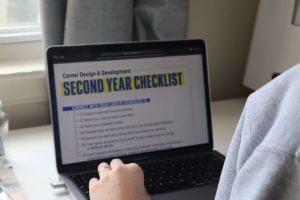As a varsity athlete, your student may find difficulties balancing academic and athletic priorities. To avoid creeping pressure and burn-out, we encourage you to be a listening ear and offer emotional support and guidance when needed.
If academic performance is slipping, encourage your student to seek available academic resources such as academic tutoring, study groups, and 1:1 office hours with their professors. Their coach and teammates are also helpful resources.
At Widener, our athletes have access to Check Up from the Neck Up—a program focused on their well-being as well as a dedicated room known as Health, Unity, and Belonging, or the H.U.B. – which is located in the Schwartz Athletic Center. The H.U.B. is designated to and designed for athletes and coaches to be used as a space to relax, grab a snack, and take a mental health break.
Finally, remember to offer words of encouragement and celebrate their successes both on and off the field. Remind them that their worth is so much more than their athletic or academic achievements and its okay to take a break to prioritize their personal well-being.




